Have you ever dreamed of leaving the city behind? To embrace a sustainable, off-grid lifestyle and live in harmony with nature? Explore Europe’s best destinations for off-grid living, from the sunny valleys of Portugal to the tranquil mountains of Bulgaria. Each location offers unique opportunities for self-reliance, sustainability, and a simpler way of life.
Choices range from Portugal’s sunny valleys and Spain’s vibrant Andalusia to the serene mountains of Bulgaria, making these some of the best places in Europe for off-grid living. Each destination offers unique beauty and challenges, including specific regulations for off-grid living. Building costs and materials vary significantly depending on the region, from the Mediterranean coasts of Greece to the picturesque countryside of France. Your ideal location depends on your personal preferences and the resources each country provides for a self-sustainable lifestyle.
Let’s dive into six amazing places for living off the grid in Europe. Are you curious about these locations and what makes them unique? Keep reading to discover your next dream escape!
Portugal: A Top Destination for Off-Grid Living
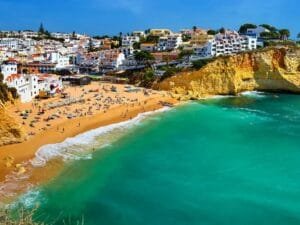
Portugal stands out as a leading destination for off-grid living in Europe. With its mild winters and hot, dry summers, it is ideal for harnessing solar power and enjoying outdoor activities year-round.
Climate
The climate in Portugal changes by the area. Coastal spots have mild, wet winters and hot, dry summers. The inner parts face harsher temperatures. These differences make Portugal fit for various sustainable living styles.
Recommended Areas
In Portugal, several areas are great for off-grid living. The Alentejo region shines with calm scenes and a climate that supports such a lifestyle. For those who love greenery, Northern Portugal offers lush areas.
- Alentejo: Tranquility and favorable climate
- North Portugal: Lush, green landscapes
Regulations
In Portugal, the rules are quite open for off-grid living, especially in the countryside. It’s easy to get permits for off-grid homes, and locals often back sustainable living plans.
Spain: Diverse Climates and Opportunities for Off-Grid Living
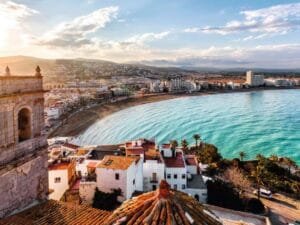
Spain offers diverse climates and landscapes, making it an excellent choice for off-grid living in Europe. From the lush greenery of Galicia to the sun-drenched fields of Andalusia, this country provides ideal conditions for self-sustainability and solar energy utilization. It’s important to know European off-grid laws to make this big move work.
Climate
Spain’s weather changes a lot from north to south. This means you can find a place that fits what you like. In the north, places like Galicia and Asturias are cool and rainy, great for green, vibrant communities. But, if you like it hot and dry, the south, especially Andalusia, is where you can use a lot of solar power.
Regulations
In Spain, the rules for living off the grid are quite good, especially if you want to use solar energy. The government even gives money and support for solar projects. But, the rules can be different in each area. For instance, Catalonia has its own laws that focus on keeping the environment safe and working well with local communities.
Recommended Areas
Several places in Spain are perfect for off-grid living. For example, Andalusia is loved by people from other countries because the land is cheaper and the weather is usually warm. This area has many communities living an alternative, sustainable way of life. Catalonia is also great, with a strong support system for living off the grid, including many communities that aim to be self-sufficient.
| Region | Climate | Key Features |
|---|---|---|
| Galicia | Temperate, Rain-prone | Abundant rainfall, green landscapes |
| Asturias | Temperate, Rain-prone | Rich natural resources, thriving flora |
| Andalusia | Hot, Arid | Low land costs, large expat community |
| Catalonia | Mediterranean | Supportive off-grid infrastructure, renewable energy focus |
Croatia: Mediterranean Charm for Sustainable Off-Grid Living
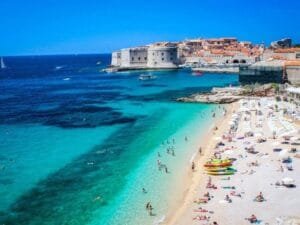
Croatia provides a balance of Mediterranean beauty and off-grid living opportunities in areas like Istria. It stands out as one of the best places for off-grid living in Europe due to its diverse climate and supportive regulations. You can choose from the sunny Mediterranean coast or the continental interior for your off-grid home.
Climate
The country enjoys different climates. The coast has a Mediterranean climate with warm summers and mild winters. The interior has hot summers and cold winters, offering great spots for living off the grid all year.
Regulations
Croatia is updating its rules to help those who want to live off-grid. They’re making it simpler to build small, eco-friendly homes. This is great for people wanting to settle down in a sustainable way.
Recommended Areas
The Island of Vis and the Istrian Peninsula are among the best places for off-grid living in Europe found in Croatia. These areas are both beautiful and have communities dedicated to green living. For instance:
- Island of Vis: It’s famous for its beauty and established off-grid groups.
- Istrian Peninsula: Known for its eco-friendly ways and gorgeous coastlines.
- Sveti Ivan Lighthouse: You can stay in unique off-grid apartments with amazing views. Prices start at €120 a night for four.
In Croatia, you can find solitude or join communities that share your values. With its beautiful scenery and supportive laws, it’s the perfect place for off-grid living.
Greece: Sunlit Landscapes and Green Living Opportunities for Off-Grid
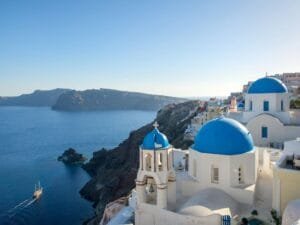
Greece is a top pick for those exploring off-grid living in Europe. Its warm weather, rich culture, and stunning views draw people in. The sunny climate and Greece’s green living initiatives make it perfect for off-grid life.
Climate
The weather in Greece means hot summers and gentle winters. This makes it ideal for solar power. Plenty of sun lets solar panels efficiently generate electricity all year.
Regulations
Building off-grid in Greece comes with strict rules, although there have been some recent relaxations. Staying informed about local laws and getting the right permits is crucial. These rules aim to protect the environment while preserving Greece’s beauty.
Recommended Areas
The Peloponnese and islands like Crete are great for off-grid ventures. Places like Milia in Crete are prime examples. They use local materials, showing what can be done.
Quiet spots in the Cyclades also offer a peaceful life close to nature. Greece blends innovation and tradition, making it a top choice for off-grid life.
France: From the Pyrenees to Normandy, Off-Grid Living at its Best
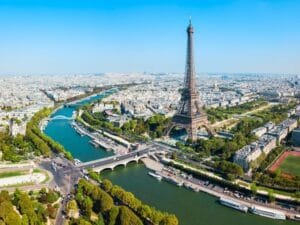
France offers a lot of choices for those into sustainable living in Europe. It has different climates and amazing landscapes. Whether you like the cold Alps or the milder coasts like Normandy and Brittany, France is great for off-grid life.
Recommended Areas
The Dordogne region and the Pyrenees are top picks for their beauty and off-grid communities. Dordogne has beautiful hills and valleys. The Pyrenees give you a chance to live in a rugged, quiet place. Places like Les Cabanes de Fontaine-Châtel, with treehouses starting at £104.81 a night, are there. You can also stay in a bubble under the stars in the Pyrenees for €100 a night for two.
These areas offer a mix of experiences for those wanting to leave the city. You can really connect with nature here.
Climate
The climate in France changes depending on where you are. The Alps are cold in winter, perfect for those who like winter sports. On the other hand, coastal areas like Normandy and Brittany have mild weather. They are great for living off-grid all year.
Recommended Areas
Provence and Auvergne are also worth considering. Provence is sunny with lovely lavender fields. Auvergne has volcanoes and is very peaceful. France supports solar and wind energy. This makes it easier to live sustainably.
In Provence, you can stay in Bioclimatic Earth Houses. They blend with nature and hardly impact the environment.
| Region | Accommodation | Cost per Night |
|---|---|---|
| Dordogne | Les Cabanes de Fontaine-Châtel | £104.81 |
| Pyrenees | The Pyrenean Bubble | €100 |
| Provence | Bioclimatic Earth Houses | Variable |
| Normandy | Eco Cottages in Coastal Areas | Variable |
France’s landscapes offer a wide range of options for sustainable, eco-friendly living in Europe. Whether you prefer the calm of Dordogne or the wilds of the Pyrenees, France has everything for your sustainable living journey.
Bulgaria: Affordable Off-Grid Living with Stunning Scenery
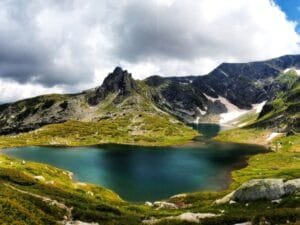
Living off the grid in Europe is unique, especially in Bulgaria. Bulgaria shines with its diverse geography and low living costs. It’s one of the best places off grid living Europe offers.
Climate
The Bulgarian climate is a mix of challenges and rewards for off-grid living. Cold winters and hot summers test your toughness. But, they teach you to be self-sufficient.
Regulations
Living off the grid in Europe means knowing the laws. Luckily, Bulgaria supports off-grid life, especially in the countryside. The rules here are friendly, helping you live off the grid easier.
Recommended Areas
Bulgaria’s varied land offers great spots for off-grid living. The Rhodope Mountains area is a favorite, with cheap land and beautiful views. It also has a friendly community.
Another top choice is the countryside near Veliko Tarnovo. It boasts history, beauty, and good living conditions. If these places excite you, consider Bulgaria for a sustainable, independent life. It stands as one of the best places off grid living Europe has.
Off Grid Technology Europe
Living off the grid in Europe is getting easier thanks to new tech. Innovations such as portable, efficient water heaters are key. They only heat water when you need it, cutting down on wasted energy. Models like the CEL5 and EL10 are great for showers and camping without normal utilities.
Also, pairing Battery Energy Storage Systems (BESS) with solar panels is making off-grid living better. The European Commission says BESS can make systems 40% more efficient. Places like EcoVillage Findhorn in Scotland show how well this can work. Despite the costs, government help and better batteries are making it easier to go off-grid.
Following European off-grid rules is crucial for safety and sustainability. Portable tankless water heaters are a smart choice. They’re good for the planet and designed to use less space and power. Europe is leading the charge in adopting these off-grid solutions, according to the International Energy Agency.
More people in the UK are choosing off-grid living, with numbers growing from 25,000 to 150,000-200,000. This includes living in sheds, vans, and boats. The trend shows a big move towards off-grid life. Navigant Research thinks the off-grid energy storage market could hit $8.4 billion by 2025. This shows a high demand for off-grid energy that’s reliable and green.
Why Europe is Ideal for Off-Grid Living
Living off the grid in Europe means a life of sustainability and self-reliance. Each country has its own climate, regulations, and communities that support off-grid living. For example, Portugal offers sunshine while Bulgaria boasts lush landscapes. These places provide a solid base for those wanting to leave the city behind.
Starting an off-grid life requires smart money choices. Using high-quality materials like wood or stone is important but can be expensive. It’s vital to know all the costs, including those you might not expect, when building a dome house. Also, being part of local off-grid communities and following their customs can help you fit in better.
But off-grid living isn’t just about money and planning. Europe is full of unique places to live the off-grid dream. You might find a cozy wooden house in Bulgaria or a forest hut in Sweden where breakfast is served. From Croatian lighthouses to treehouses in France, there’s something for every taste and budget.
As you begin, remember that success in off-grid living means looking at the big picture. Financial smarts, respecting local customs, and staying true to your sustainable ideals are key. This approach will help you, and the community around you, thrive. Your new life, close to nature and based on your own efforts, is waiting for you in Europe’s varied landscapes.
FAQ
What are the best places in Europe for off-grid living?
Europe has many great spots for living off the grid. You can find beautiful places in Scandinavia and the Mediterranean areas of Portugal, Spain, Croatia, Greece, France, and Bulgaria. Each has unique nature, friendly communities, and good laws for sustainable living.
What is the climate like for off-grid living in Portugal?
Portugal has mild winters and hot, dry summers. It’s great for using solar power and being outdoors. This weather helps people live sustainably using renewable energy sources.
Where are the recommended areas for off-grid living in Portugal?
The best spots are the peaceful Alentejo and the green northern Portugal. These places are beautiful and have laws that support off-grid life.
What are the regulatory aspects of off-grid living in Portugal?
Portugal’s laws are generally open to off-grid living, especially in less populated areas. This makes it easier to choose this lifestyle.
How is the climate for off-grid living in Spain?
Spain has varied weather. The north is cool and rainy, while the south is hot and dry. This means you have many sustainable living options.
What are the regulations for off-grid living in Spain?
Spain supports renewable energy like solar power. Yet, each region has its own rules, so it’s important to look into local regulations.
Which areas in Spain are best for off-grid living?
Andalusia and Catalonia are great choices. Andalusia has cheaper land and a big expat community. Catalonia is known for its strong alternative living communities.
What is the climate like in Croatia for off-grid living?
Croatia has a Mediterranean climate along the coast and a continental one inland. This gives lots of options for living off the grid all year.
What are the regulations for off-grid living in Croatia?
Croatia is getting better at supporting small, eco-friendly homes. This makes sustainable living easier.
What areas in Croatia are recommended for off-grid living?
The Island of Vis and the Istrian Peninsula are great for off-grid living. They are beautiful and have growing off-grid communities.
How does Greece’s climate support off-grid living?
Greece’s warm weather is perfect for using solar power. This helps support a sustainable lifestyle with lots of sun.
What are the regulations for off-grid living in Greece?
Greece has strict rules, but they are relaxing them to boost tourism and the economy. So, living off the grid is getting easier.
Where are the recommended areas for off-grid living in Greece?
The Peloponnese and the islands are great. They offer remote living with plenty of nature and resources.
What climate should you expect for off-grid living in France?
France’s weather varies. It has cold mountains and warm coasts. So, you can choose what suits your off-grid life best.
What areas in France are best for off-grid living?
The Dordogne and the Pyrenees are popular. They have beautiful remote areas and well-established off-grid communities.
What regulations support off-grid living in France?
France encourages using solar and wind power. It has good laws that help people live sustainably off the grid.
What is the climate like in Bulgaria for off-grid living?
Bulgaria has cold winters and hot summers. It’s challenging but rewarding for those who want to live off the grid.
What are the regulations for off-grid living in Bulgaria?
Bulgaria’s rural areas, especially around the Rhodope Mountains and Veliko Tarnovo, are very supportive of self-sufficient living.
Which areas in Bulgaria are recommended for off-grid living?
The Rhodope Mountains and areas near Veliko Tarnovo are good choices. They offer affordability and supportive local policies.
What advancements in technology are making off-grid living in Europe more manageable?
New solar panels, water purification, and other technologies are making sustainable living easier across Europe. This lets more people live without depending on traditional services.
Source Links
- Off grid living arrangements (legal and other) in various EU Countries
- Best Places to Live Off Grid in the UK | Live Off Grid
- 15 of the best off-grid places to stay in Europe
- 23 Best hidden gems in Europe: off the beaten path places for 2023
- Portable Water Heaters: Key to Sustainable Off-Grid Living in Europe
- Guide to Off-Grid Communities in The UK – Jackery UK
- Off-Grid Living & Battery Energy Storage

